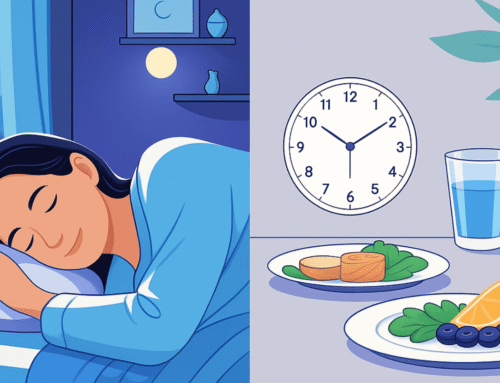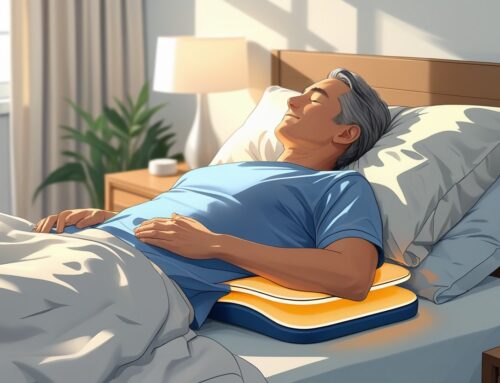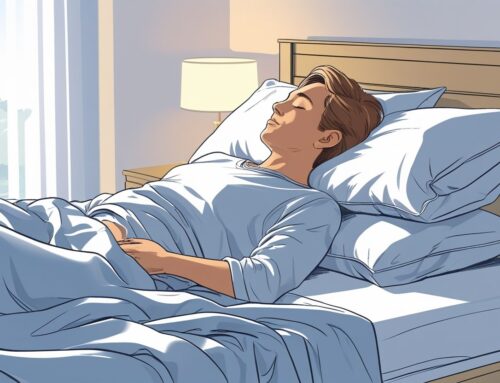Cortisol is a hormone that helps regulate the body’s response to stress and plays a key role in the sleep-wake cycle. High cortisol levels in the evening can interfere with sleep, which makes it harder to fall or stay asleep. This connection between cortisol and sleep explains how stress and other factors affect rest.
Cortisol levels naturally rise and fall throughout the day, guided by the body’s internal clock, or circadian rhythm. Disruptions to this rhythm, whether from stress, poor lifestyle habits, or certain health conditions, can lead to sleep issues like insomnia. Keeping cortisol in balance supports better sleep and overall health.
Key Takeaways
- Cortisol affects how easily the body falls and stays asleep.
- The internal clock regulates natural cortisol patterns.
- Balanced cortisol levels support healthier sleep.
- A supportive mattress reduces discomfort and stress, which helps lower cortisol levels and promotes restful sleep.
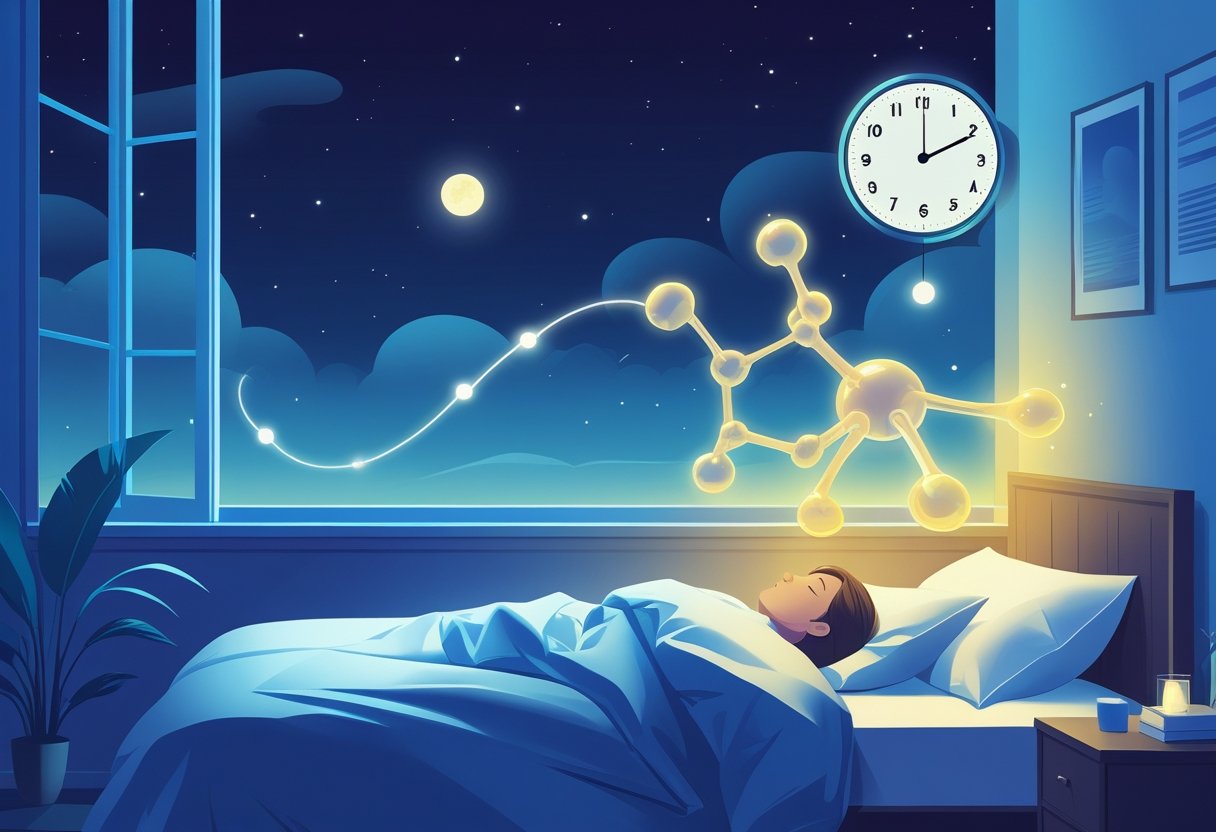
Understanding Cortisol
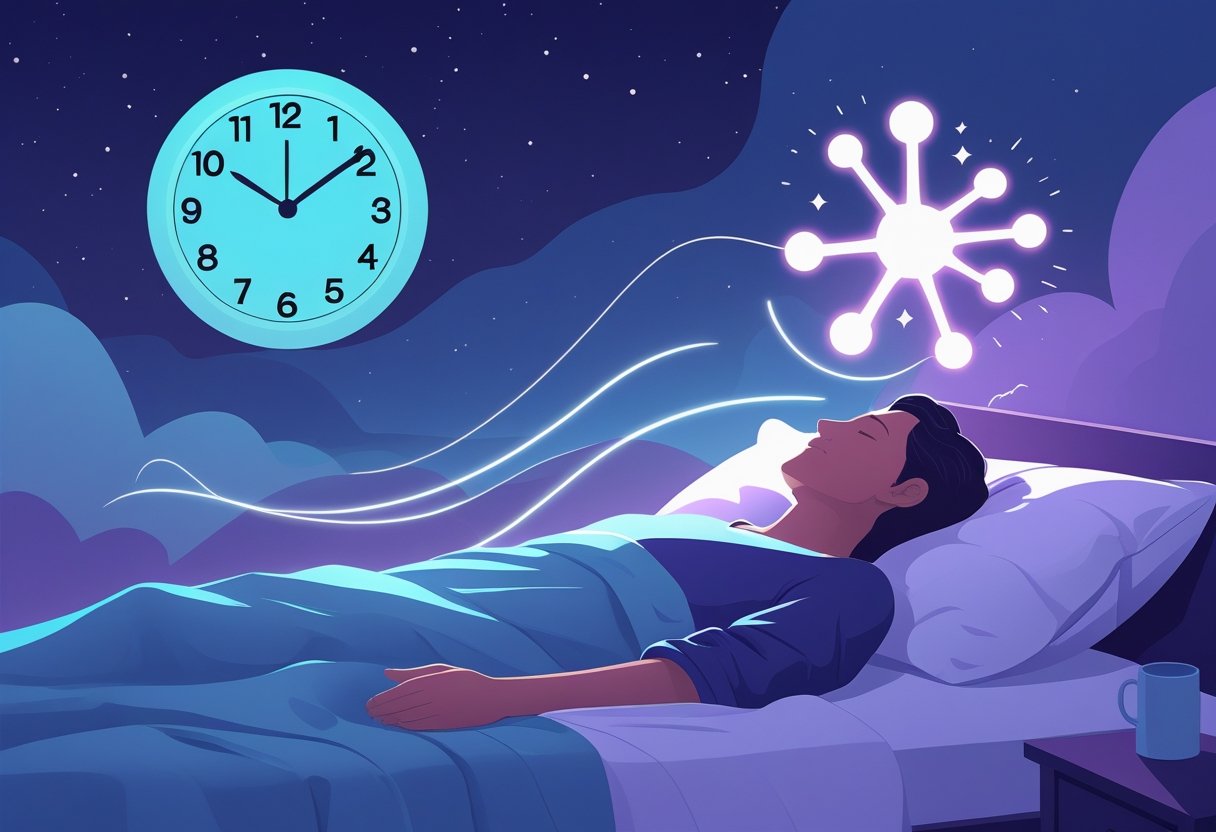
Cortisol is an important hormone in many body functions. It affects how the body handles stress, uses energy, and follows daily rhythms, including sleep patterns. Understanding what cortisol does helps explain its impact on sleep and overall health.
What Is Cortisol?
Cortisol comes from the adrenal glands and is often known as the “stress hormone” because it activates the body’s fight-or-flight response during stressful moments. Its levels shift throughout the day, following a natural 24-hour rhythm.
Cortisol usually peaks in the morning to help the body wake up. It then steadily drops during the day and reaches its lowest point at night to support deep, restful sleep. When cortisol remains elevated in the evening, it may interfere with sleep and lead to issues like insomnia.
Cortisol’s Role in the Body
Cortisol has several important roles. It helps regulate metabolism by managing blood sugar levels and energy use. In times of stress, cortisol releases stored energy so the body can respond quickly. It also affects the immune system and lowers inflammation. Cortisol helps regulate the body’s internal clock, called the circadian rhythm, which guides the sleep-wake cycle.
When cortisol stays out of balance, especially at night, it can disturb sleep and influence memory, weight, and metabolism. Keeping cortisol in check through stress management and healthy routines supports better sleep and long-term health.
The Science of Sleep
Sleep is a complex process made up of different stages. Each stage serves a specific purpose in helping the body rest and repair. Hormones like cortisol directly influence these stages and shape the quality of sleep.
Phases of Sleep
Sleep breaks down into two main types: Non-Rapid Eye Movement (NREM) and Rapid Eye Movement (REM) sleep. NREM includes three stages. The first two are light stages where the body begins to relax. The third is deep sleep, which supports physical recovery and strengthens memory.
REM sleep follows NREM and typically includes dreaming. The brain stays active during REM, but the body remains still. Cortisol levels reach their lowest point during deep NREM sleep, giving the body a chance to fully rest. Toward morning, cortisol begins to rise and helps the body transition into wakefulness.
Regulation of Sleep Cycles
Each sleep cycle lasts about 90 to 120 minutes. The body’s internal clock, or circadian rhythm, determines when sleep begins and ends. Cortisol levels follow this rhythm closely—dropping after falling asleep and rising just before waking.
Sleep loss or disorders may disrupt this rhythm. For instance, skipping sleep can lead to elevated cortisol levels in the evening, which interferes with falling asleep. This pattern highlights how balanced cortisol levels help maintain consistent sleep cycles.
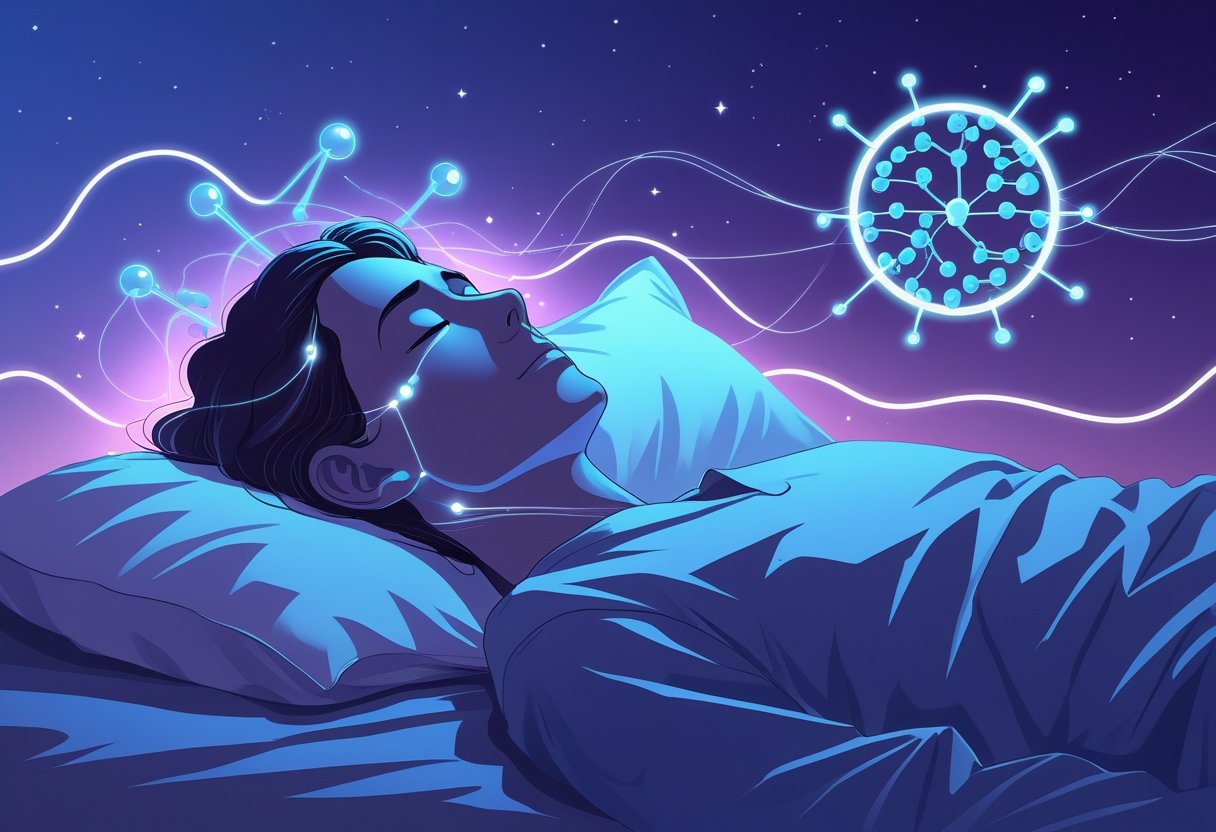
Cortisol’s Effect on Sleep Quality
Cortisol is essential in controlling sleep patterns and overall sleep quality. Its levels shift naturally throughout the day and night, influencing how easily someone falls asleep and stays asleep. The timing and amount of cortisol either support or disrupt the body’s internal sleep clock.
How Does Cortisol Affect Sleep?
Cortisol follows a daily rhythm, staying low in the evening and peaking early in the morning. This pattern promotes alertness upon waking and encourages relaxation at night. However, elevated cortisol levels at night often interfere with falling asleep or sleeping through the night.
Stress or a misaligned body clock usually causes cortisol to rise at the wrong times. This often leads to sleep fragmentation, where a person wakes up several times during the night. Proper cortisol timing signals the body when to be alert and when to wind down.
Cortisol Levels and Sleep Architecture
Sleep architecture refers to the stages of sleep the body cycles through each night. Cortisol influences these stages, particularly deep sleep and REM (rapid eye movement) sleep. Elevated evening cortisol typically reduces deep sleep, which supports physical recovery and memory consolidation.
Lower cortisol levels at night help maintain smooth transitions through light, deep, and REM sleep. When cortisol remains high, sleep tends to become lighter and more interrupted. This imbalance in sleep stages may impact energy, mood, and overall health during the day.
Keeping nighttime cortisol within a normal range helps protect sleep structure and supports the body’s natural rhythm.
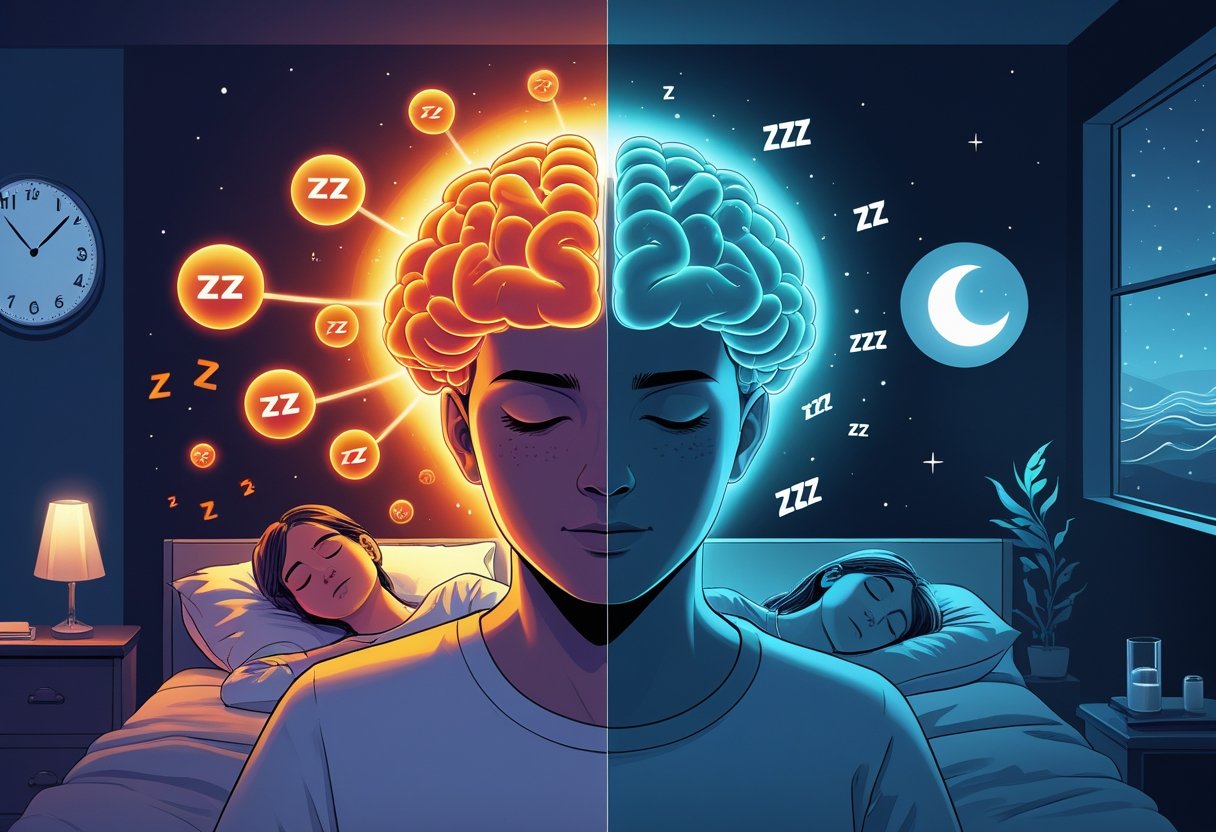
Cortisol and Insomnia
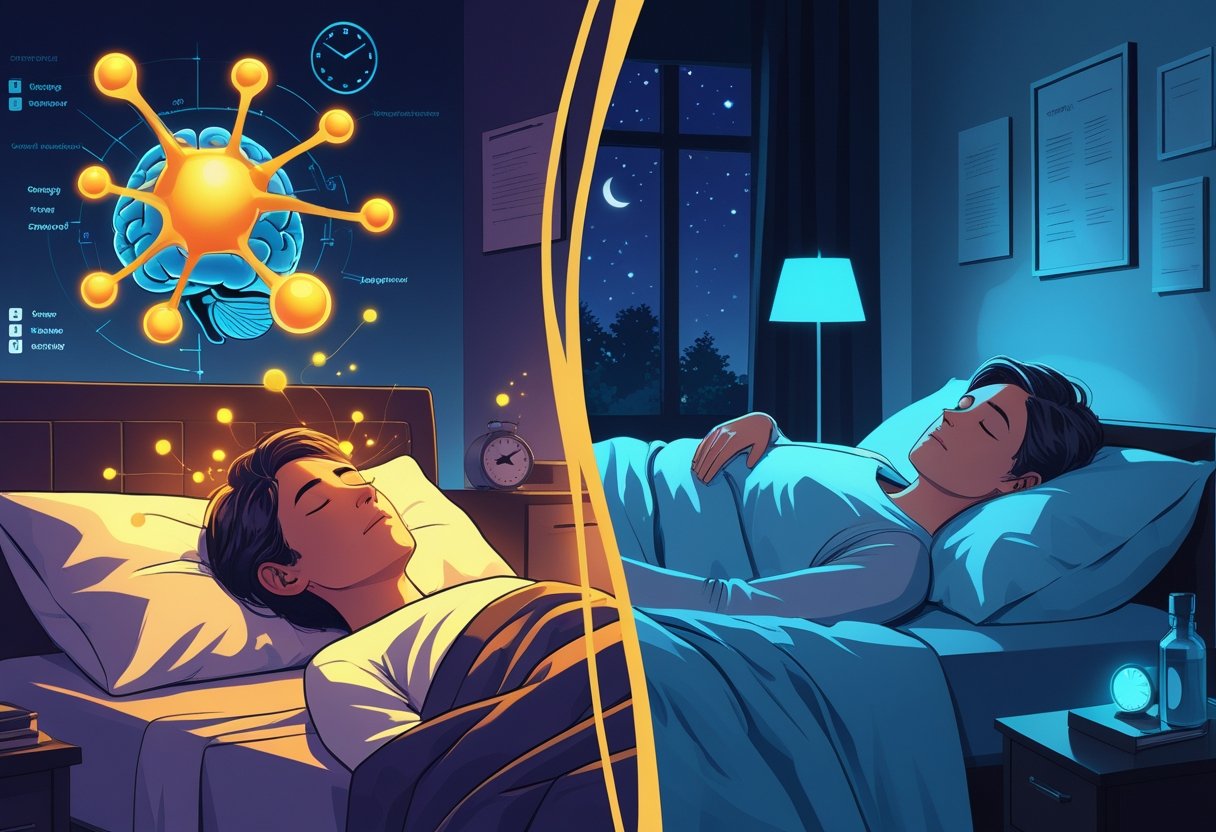
Cortisol is important in the body’s stress response and natural sleep-wake cycle. Elevated cortisol levels, especially at night, interfere with falling and staying asleep. A clear understanding of how cortisol impacts sleep explains why some people face persistent insomnia.
Cortisol Insomnia Connection
Cortisol typically peaks in the early morning to wake the body and drops in the evening to promote relaxation and sleep. If cortisol remains high at night, it disrupts this natural rhythm.
High cortisol insomnia results from stress triggering excess cortisol release. This response blocks the body from reaching deep, restorative sleep stages. Over time, this creates a cycle: poor sleep increases cortisol, which then deepens insomnia.
People under chronic stress or anxiety often face this imbalance. Conditions such as chronic insomnia and sleep disorders like sleep apnea link to elevated nighttime cortisol. Lowering cortisol through lifestyle adjustments may improve sleep quality.
Symptoms of High Cortisol Insomnia
Common signs include trouble falling asleep and frequent nighttime awakenings. Many feel restless or anxious once in bed. Other symptoms include morning fatigue despite a full night in bed and reduced focus during the day. Some also notice a faster heart rate or muscle tension at night, which are both signs of elevated cortisol.
These symptoms differ from ordinary sleep issues since they often involve stress-related triggers. If someone asks, “Can high cortisol cause insomnia?” The answer is yes, especially when stress persists.
Symptoms and Descriptions:
- Difficulty falling asleep – Trouble initiating sleep even when tired
- Nighttime awakenings – Waking up multiple times during the night
- Restlessness – Feeling unsettled or anxious in bed
- Morning fatigue – Waking up tired or unrefreshed
- Daytime concentration issues – Difficulty focusing or problems staying alert
Managing cortisol may help ease these symptoms and restore a more regular sleep pattern.
Circadian Rhythms and Cortisol
Cortisol follows a daily cycle that regulates many body functions. This hormone rises and falls at specific times, which influence sleep and alertness. Understanding how cortisol behaves at night and why it spikes can clarify its impact on health.
Cortisol Levels at Night
Cortisol levels usually drop in the late afternoon and stay low through the early part of the night. This decline allows the body to rest without the hormone’s stimulating effects. During the circadian nadir, a 4–6 hour window at night, cortisol reaches its lowest point, supporting deep, restorative sleep.
When cortisol remains too high at night, it may disturb sleep and lead to trouble falling or staying asleep. A proper drop in cortisol helps prevent the negative effects of excess glucocorticoid activity during rest. Keeping this rhythm intact supports a balanced stress response and stable metabolism.
Why Does My Cortisol Spike at Night?
A nighttime cortisol spike usually stems from stress, irregular sleep habits, or shift work. Stress can prompt the adrenal glands to release cortisol outside its natural rhythm. People who work night shifts frequently experience this disruption, causing cortisol to rise when it should remain low.
Other possible causes include anxiety or medical conditions that impair hormone regulation. A spike at night signals the body to gear up for activity, which directly opposes the need to unwind for sleep. This mismatch can worsen insomnia and reduce overall sleep quality.
Cortisol Spike at Night
A cortisol spike at night may lead to symptoms like trouble falling asleep, frequent awakenings, or restless sleep. It can also increase blood sugar and disrupt metabolism. Repeated spikes raise the risk of long-term health issues such as weight gain and memory decline.
To help reduce these spikes, try managing stress and improving your sleep routine. Consistent sleep schedules, calming nighttime rituals, and avoiding caffeine or screens before bed can all help. Researchers continue to explore more natural ways to monitor cortisol rhythms and understand their effects on nighttime health.
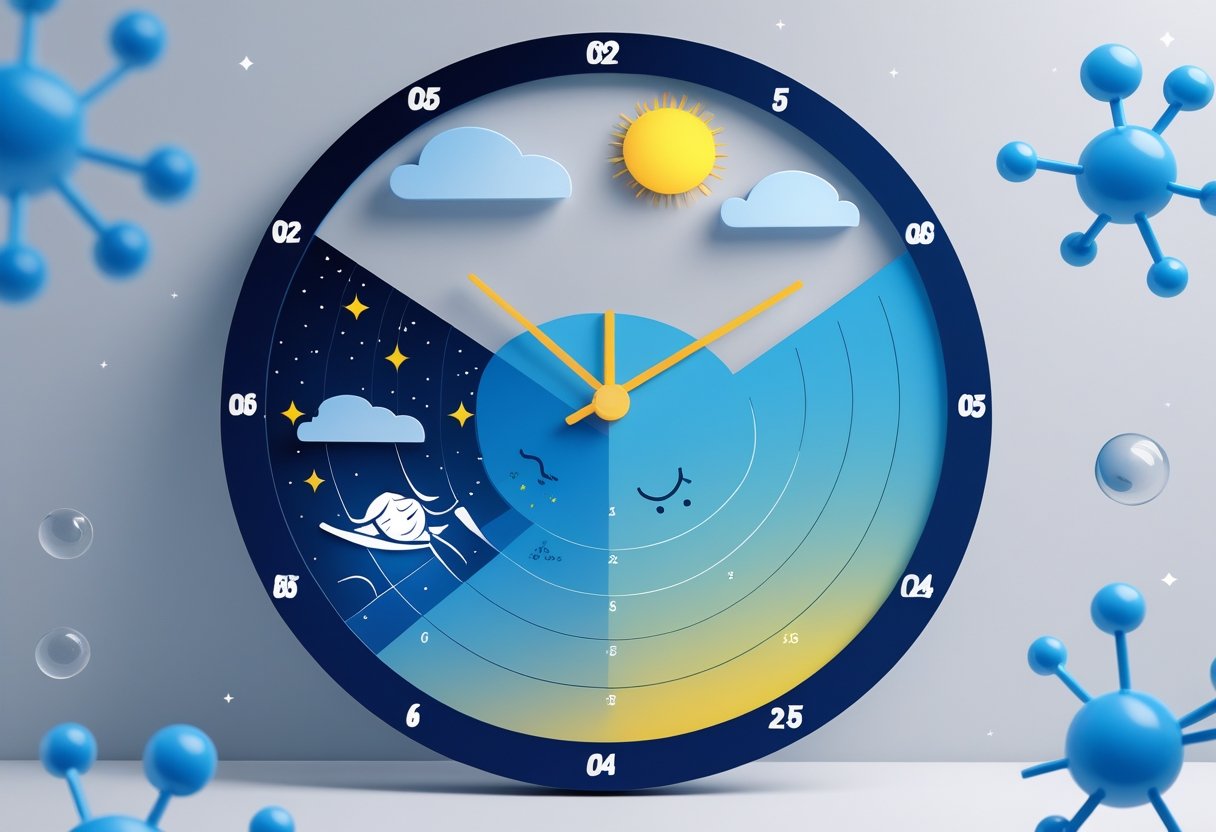
Factors Influencing Cortisol and Sleep
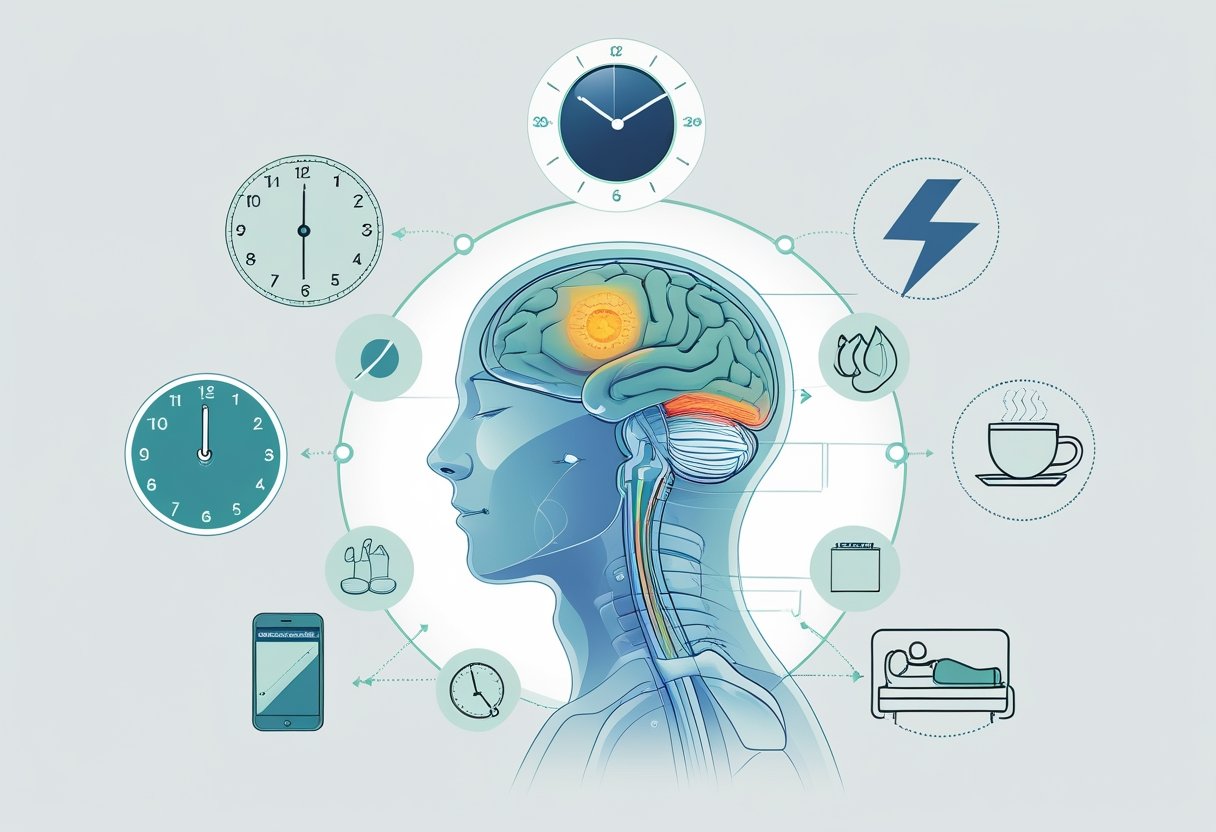
Cortisol levels shift based on many daily actions and habits. The way someone handles stress and sticks to routines influences this hormone’s rhythm, which in turn affects sleep quality. Diet choices and physical activity also shape how well cortisol stays in check.
Stress and Daily Habits
Stress is one of the main triggers for high cortisol levels. When someone deals with ongoing stress, the body releases more cortisol to cope with the pressure. As a result, falling asleep or staying asleep becomes more difficult.
Daily routines, such as inconsistent sleep schedules or too much screen time at night, can disrupt cortisol patterns. Normally, cortisol dips in the evening to support rest, but poor habits may cause spikes. Sticking to regular sleep and wake times helps maintain a healthy rhythm. Relaxation techniques like meditation or deep breathing reduce cortisol. Using these methods to manage stress often helps prevent nighttime cortisol surges, which supports better sleep.
Diet and Exercise
Cortisol responds to what someone eats. Foods rich in sugar and caffeine tend to raise cortisol, especially when consumed later in the day. Balanced meals that include protein, healthy fats, and fiber help stabilize levels.
Regular exercise helps lower stress and reduce cortisol in the long run. However, intense workouts too close to bedtime may raise cortisol temporarily and interfere with sleep. Scheduling workouts in the morning or early afternoon works best for hormone balance. Hydration is also important. A lack of water can lead to higher cortisol, so drinking enough fluids helps support both hormonal stability and better sleep.
Managing Cortisol for Better Sleep
Controlling cortisol levels improves sleep quality and overall restfulness. Adjustments in daily habits, along with professional treatments, both play important roles in maintaining balanced cortisol levels.
Lifestyle Strategies
Following a regular sleep schedule helps regulate cortisol naturally. Sleeping and waking at consistent times supports the body’s internal clock and limits stress hormone surges. Exercise also helps when timed right. Morning or early afternoon workouts tend to lower cortisol, while evening sessions can raise it and interfere with sleep.
Cutting back on caffeine and sugar, especially later in the day, helps prevent cortisol spikes. Relaxation methods like deep breathing, meditation, or light yoga also ease stress and promote lower cortisol levels before bedtime.
Keeping a calm nighttime routine matters. Turning off screens and dimming lights one to two hours before bed signals the body to release melatonin and reduce cortisol, which makes it easier to fall asleep and stay asleep.
Medical and Therapeutic Approaches
When lifestyle shifts fall short, medical support may be necessary. Doctors usually check hormone levels to identify issues linked to cortisol imbalance.
Cognitive behavioral therapy (CBT) can reduce stress and anxiety that elevate cortisol. It teaches people how to change thought patterns and behaviors that disturb sleep. Medication may help regulate cortisol in certain cases, though it must come under a doctor’s supervision. These treatments aim to resolve the root causes of high cortisol, not just ease the symptoms.
Ongoing medical care helps prevent cortisol-related sleep issues from escalating. When sleep problems persist despite lifestyle efforts, professional input becomes essential.
How the Right Mattress Can Help Regulate Cortisol and Improve Sleep Quality
A good mattress supports the body’s natural alignment and reduces pressure points that cause discomfort. When the body feels comfortable, falling asleep and staying asleep becomes easier. This deeper and uninterrupted rest helps keep cortisol levels balanced.
Poor-quality mattresses cause pain or promote poor posture during sleep. These issues usually result in restless nights and frequent waking. Discomfort increases stress, which may raise cortisol levels and make relaxation difficult. Choosing an adequate mattress lowers this risk and promotes better sleep hygiene.
Key benefits of a good mattress include:
- Improved spinal alignment that reduces muscle strain
- Less tossing and turning, allowing for longer sleep periods
- Reduced pain, especially for those with back problems
Better sleep allows the body to regulate cortisol more effectively. Since cortisol serves as a stress hormone, reducing its levels through restful sleep supports a healthier stress response throughout the day. Research shows that people using adequate mattresses gain up to 20% more restful sleep than those with poor bedding. This improvement helps maintain a normal cortisol rhythm and enhances overall sleep quality.
For those considering an upgrade, the Layla Memory Foam Mattress features a flippable design with two firmness options to suit different comfort preferences. Its copper-infused memory foam encourages cooler sleep and provides targeted support, which may improve sleep quality and contribute to balanced cortisol levels.
Layla Memory Foam Mattress also provides benefits such as pressure point relief and improved spinal alignment, reducing tossing and turning. The design assists in dissipating heat and keeps sleepers cool throughout the night, a factor usually overlooked but essential for uninterrupted rest and proper hormone regulation.

Frequently Asked Questions
Cortisol levels can reveal specific signs when elevated at night, disrupting the natural sleep-wake cycle. Changes in cortisol impact sleep quality and weight, and symptoms may vary based on gender.

